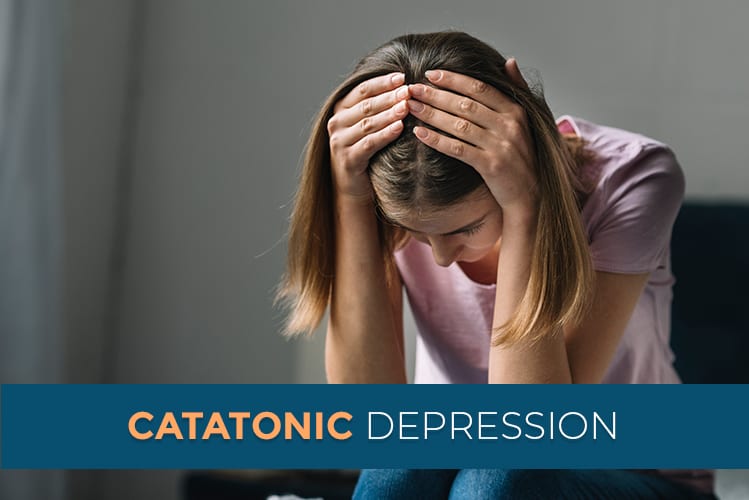Depression is a serious mental illness that can affect anyone, regardless of age, gender, or race. While there are many different types of depression, catatonic depression is one of the most severe. In this blog post, we will discuss the symptoms, treatment, and more about catatonic depression. If you or someone you know is suffering from this condition, it is important to get help right away!
Contents
What Is Catatonic Depression?
 Catatonic depression is a rare but serious type of depression that is characterized by muscle immobility and abnormal movements. People with catatonic depression may also experience other symptoms, such as hallucinations, delusions, and disorganized thinking. In simple words, it is described as a state of complete mental and physical shutdown.
Catatonic depression is a rare but serious type of depression that is characterized by muscle immobility and abnormal movements. People with catatonic depression may also experience other symptoms, such as hallucinations, delusions, and disorganized thinking. In simple words, it is described as a state of complete mental and physical shutdown.
Many people can experience muscle immobility and abnormal movements without having catatonic depression. For example, people with Parkinson’s disease may experience these symptoms. However, in the case of catatonic depression, these symptoms are not due to a physical condition but rather to a mental health condition.
Therefore, you should see a mental health professional if you experience any of the symptoms of catatonic depression. With proper treatment, you can manage your symptoms and live a healthy and fulfilling life. Just do not ignore the signs and symptoms of this serious mental health condition.
Is Catatonia A Symptom Of Depression?
Sometimes, people with clinical depression can seem like they’re in a state of catatonic stupor. This is called catatonic depression. It’s a rare but serious type of depression that requires immediate treatment…
Catatonia is a condition that leads to muscle rigidity and immobility. People with catatonia may also have abnormal movements, such as repetitive motions or purposeless movements. It is a type of depression that impacts life to a larger extent. There are three types of catatonic depression:
- Excited: Characterized by agitated or aggressive behavior.
- Stuporous: Characterized by a state of reduced consciousness.
- Akinetic: Characterized by complete muscle paralysis.
Though, catatonic depression is a rare but serious condition. It’s important to get treatment right away if you think you might have it. If left untreated, catatonic depression can lead to serious complications, such as self-harm, coma, and even death.
How Long Does Catatonic Depression Last?
 This is difficult to answer because the duration of catatonic depression can vary greatly from person to person. Some people may only experience a few episodes in their lifetime, while others may have recurrent episodes.
This is difficult to answer because the duration of catatonic depression can vary greatly from person to person. Some people may only experience a few episodes in their lifetime, while others may have recurrent episodes.
There is no set timeline for recovery from catatonic depression, but most people do eventually recover with treatment. Moreover, there is no evidence that this type of depression gets worse over time. But there are some people who never fully recover and may require long-term care.
Therefore, if you or someone you know is struggling with catatonic depression, it is important to seek professional help. With treatment, most people can eventually recover and live healthy and fulfilling lives. Though it takes time and effort, it is worth it.
What Are The Common Symptoms?
There are various signs and symptoms associated with catatonic depression, and they can range from mild to severe. The most common include:
- Agitation: It is not uncommon for people with catatonic depression to be in a state of agitation. This can manifest itself in various ways, such as pacing back and forth or being unable to sit still.
- Anxiety: People with catatonic depression often experience anxiety and may even have panic attacks.
- Depressed mood: This is, of course, one of the main symptoms of depression. People with catatonic depression may also experience feelings of hopelessness and despair.
- Delusions: These are false beliefs that a person holds onto despite evidence to the contrary. People with catatonic depression may have delusions about their health, their relationships, or even the world around them.
- Hallucinations: Hallucinations are when a person sees, hears, or feels things that are not really there. People with catatonic depression may have visual or auditory hallucinations.
- Inability to speak: This is known as mutism and can be one of the most debilitating symptoms of this condition.
- Delirium: It is not uncommon for people with catatonic depression to become delirious. This can manifest itself in a number of ways, such as becoming confused and disoriented or having incoherent speech.
- Hostility: This seems to be a relatively common symptom of catatonic depression. People may become hostile towards others for no apparent reason.
If you or someone you know is exhibiting any of these symptoms, it is important to seek professional help as soon as possible. Left untreated, catatonic depression can lead to serious consequences, such as self-harm or even suicide.
What Causes Catatonic Depression?
 There are many possible causes of catatonic depression. Some of the common ones are listed below:
There are many possible causes of catatonic depression. Some of the common ones are listed below:
- A family history of mental illness: This is one of the most significant risk factors for developing catatonic depression. If you have a parent or sibling who has suffered from a mental illness, your chances of developing one are significantly higher.
- Trauma: Experiencing a traumatic event can trigger the onset of catatonic depression. This could be something like witnessing a loved one die, being the victim of a crime, or surviving a natural disaster.
- Chronic stress: Prolonged exposure to stress can lead to catatonic depression. This could be from things like job insecurity, financial problems, or relationship difficulties.
- Substance abuse: Abusing drugs or alcohol is another possible cause of catatonic depression.
- Medical conditions: Some medical conditions can increase your risk of developing catatonic depression. These include thyroid problems, anemia, and certain types of cancer.
These are just some of the possible causes of catatonic depression. If you think you may be suffering from this condition, it’s important to see a mental health professional for an accurate diagnosis. Sometimes, there could be other triggers of this condition that are unique to you. These include:
- A major life change: Going through a big change, like getting married or divorced, starting a new job, or moving to a new city, can be tough. For some people, these changes can trigger catatonic depression.
- Grief: Losing someone you love, whether it’s from death, divorce, or any other reason, can be incredibly difficult. It’s not uncommon for people to develop this condition after going through a major loss.
If you are experiencing any of the symptoms of this type of depression, it’s important to seek help from a mental health professional. With proper treatment, you can start to feel better and get your life back on track.
How Is It Diagnosed?
The diagnosis of catatonic depression is made by a mental health professional, such as a psychiatrist, who does a clinical evaluation. This generally includes taking a detailed history and doing a physical examination.
There are no laboratory tests that can diagnose this condition. However, the mental health professional may order some tests to rule out other conditions that may be causing the symptoms. These methods are important in order to ensure that the correct diagnosis is made and that the person receives appropriate treatment.
It is important to understand that this type of depression is a very serious condition that can be fatal if left untreated. If you or someone you know is exhibiting any of the above symptoms, it is important to seek professional help as soon as possible.
How To Treat It?
 There are a few types of treatments for catatonic depression:
There are a few types of treatments for catatonic depression:
- Medication
- Therapy
- Electroconvulsive therapy
- Lifestyle changes
Largely, these are some common treatments to help you with this type of depression. Let’s deal with each one.
Medication
This option is considered when other treatments haven’t worked. Medication can help with the underlying issues that are causing your condition. Some common medications are:
- Anti-psychotics
- Benzodiazepines
- Selective serotonin reuptake inhibitors (SSRIs)
It is believed that anti-psychotics and benzodiazepines can help with the symptoms related to catatonic depression by acting on the central nervous system. SSRIs, on the other hand, increase serotonin levels and are used to treat conditions like anxiety and depression.
However, before taking any medication, you must speak to a doctor to see if it is the right option for you.
Therapy
This is considered to be one of the most effective treatments for catatonic depression. It involves meeting with a therapist regularly to discuss your symptoms and thoughts. Cognitive behavioral therapy (CBT) is a type of therapy that can be particularly helpful in treating this condition. CBT focuses on changing negative thought patterns and behaviors that may be contributing to your condition. Some other therapies that can be helpful include:
- Interpersonal therapy: This type of therapy focuses on your relationships and communication styles. It can help you to identify and change any negative patterns in your interactions with others.
- Family therapy: This type of therapy can help address any family conflict or dysfunction that may be contributing to your condition.
- Group therapy: This can be a helpful way to connect with others who are struggling with similar issues. It can provide support and allow you to share your experiences in a safe and supportive environment.
Electroconvulsive therapy
It is not known exactly how ECT works to treat catatonic depression. It is thought that electrical stimulation may help to change brain chemistry and improve communication between different areas of the brain. ECT is usually done in a hospital setting and requires anesthesia.
A brief electrical current is passed through the brain, causing a seizure. The seizure lasts for about 30 seconds. ECT is usually given three times a week for two to four weeks. It is generally safe and effective for treating this condition. However, there are some risks associated with the procedure, including memory loss and confusion.
Lifestyle changes
 Many people with depression find that making lifestyle changes helps them manage their condition. These are as follows:
Many people with depression find that making lifestyle changes helps them manage their condition. These are as follows:
- Exercise, for example, releases endorphins, which have mood-boosting effects. Getting regular exercise can also help reduce the risk of developing depression in the first place.
- Healthy eating habits are also important. Some research suggests that certain foods may help improve mood and protect against depression. These include omega-three fatty acids, found in fish, nuts, and seeds; folic acid, found in leafy green vegetables; and probiotics, which are live bacteria that are found in yogurt and other fermented foods.
- It is also important to get enough sleep. Research shows that people who are sleep-deprived are more likely to be depressed.
- Finally, social support is crucial. People who have strong social networks are less likely to develop depression. So make sure to stay connected with friends and family.
These things will help you immensely in your journey to recovery. If you or someone you know is struggling with this condition, there is help available. The first step is to talk to a doctor or mental health professional. They can assess the situation and develop a treatment plan.
Conclusion
To conclude, catatonic depression is not an easy disorder to live with. The key to managing the condition is to seek professional help as soon as possible. With the right treatment, people with this condition can lead happy and fulfilling lives. More often than not, the first step to treatment is medication. If you or someone you know is showing signs of this condition, don’t hesitate to reach out to a mental health professional.
For more information and guidance on this type of depression, please get in touch with our expert therapists at Therapy Mantra. They will be more than happy to assist you on your journey to recovery. Contact us today to learn more about our services. You can also book an online therapy session or download our free Android or iOS app.


